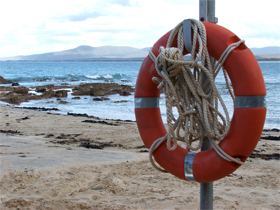How to Survive a Solo
 Soloing can be like being shipwrecked. Suddenly, you’re thrust into the water. It’s cold and disorienting. You swallow a mouthful of water. Your mind goes blank. You cast about for something to save you, to help you stay afloat. No, that piece is too small! Ouch! That piece is sharp. Many times when someone is struggling to create a solo, I watch her pick up and discard workable ideas in panic.
Soloing can be like being shipwrecked. Suddenly, you’re thrust into the water. It’s cold and disorienting. You swallow a mouthful of water. Your mind goes blank. You cast about for something to save you, to help you stay afloat. No, that piece is too small! Ouch! That piece is sharp. Many times when someone is struggling to create a solo, I watch her pick up and discard workable ideas in panic.
Here’s my advice.
Take a breath. Float on the water. Get your hair out of your eyes and evaluate your situation. Listen to the music happening around you. Is it calm? Is it rocky? Is it gray or blue?
Next, (for beginners and poor swimmers) use the first functional idea you find. OK, you don’t love it, maybe it’s not brilliant, but … does it work? If it’s workable, you can build on it. It’s like finding a board floating nearby and climbing on.
Survey the landscape. Are there things nearby you can use to expand your raft? Try to find ideas that fit well (or easily) with your first idea. Maybe it’s notes in the scale or words in the family of your first idea.
Build your raft. Be conscious that you are constructing a narrative, the beginning of a story.
Pick a destination. Now that you’re on your raft, decide where you want to go. Fiji? Back to the mainland? A good solo has a beginning, middle and end.
[…] the beginning and move to the end. Sometimes you have to find your way into what’s happening any way you can. Sometimes the middle or end happen first. (Then they become the beginning. […]
17 Aug 2009 at 12:15 am
There’s always “safety” in the repetition of an idea – then adding small changes in rhythm and melodic contour. Small changes lead to the next idea to play with. Give yourself a “lagoon” or “cove” to swim in – possibly an easier way into the ocean.
26 Oct 2009 at 1:01 pm
Hi Vicky,
I love your ideas about the lagoon and cove. Excellent additions! *smile*
singingly,
sg
26 Oct 2009 at 5:22 pm
[…] It’s like soloing in an improv. […]
10 Sep 2010 at 1:54 pm